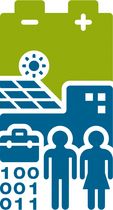
IÖW-Projects
Every year the IÖW works on approximately 60 research projects. Since its existence the instiute has completed more than 600 projects.
Enable advanced search
42 running Projects // 350 Projects in total
Financial participation of affected municipalities in planning, construction and operation of renewable energy plants FinBEE
New Alliances for Sustainability Policy Cooperation perspectives for environmental actors with unions, social organization and charities
River Ecosystem Service Index – Practical implementation in the Lahn river basin (RESI-Lahn)
Online value added calculator for renewable energies – Update 2020
Social-ecological economy within planetary boundaries
Energy storage services for smart neighbourhoods (Esquire)
Distribute Green Local Supply Chains for Tomorrow’s City
Biodiversity Criteria in Public Procurement II Further development and practical concretization of biodiversity criteria in selected public procurement product groups of the German Federal Government
example project
PADO – Processes and Implications of Dune Breaching at the German Baltic Sea Coast Subproject Economic Valuation
Regional flexibilities of prosumers in households and in the commercial sector Determination of regional flexibilities as part of the project „WindNODE – showcasing smart energy systems from northeastern Germany”
Municipalities in Climate Emergency: Processes, Properties and Focuses
Sustainable bioeconomy in Brandenburg – Examples of climate-friendly and environmentally friendly regional value chains
Urban Heat Shift Participatory Transformation of Coupled Infrastructures, Focusing on Heat Supply in Berlin
Detailed Economic Analysis of Individual Policy Instruments and Measures for Climate Change Adaptation




